Connor Trinneer didn’t understand Trip’s death
By rachel carrington | aug 6, 2021.
Trip Tucker’s death was a bone of contention
The series finale of Star Trek: Enterprise after four seasons still stands out sixteen years later and not for good reasons. Most everyone disliked the inclusion of characters Will Riker and Deanna Troi from Star Trek: The Next Generation as well as the jump forward in time and the holodeck simulation. Overall, few fans have “These Are the Voyages” on their to-be-watched-again list. And faithful viewers who had grown attached to all of the characters on Enterprise were livid at the death of Chief Engineer, Charles “Trip” Tucker, III.
Trip had gotten out of a lot of situations in his time as the chief engineer, including almost dying from dehydration in the desert, almost dying aboard a shuttlepod in the freezing cold with Lt. Reed, and being trapped on a planet with an enemy who kept trying to kill him. That was another situation where he almost died from heat exposure. On top of those, Trip had helped get the Enterprise out of some pretty gnarly situations without dying. So what ends up killing him is his decision to blow up intruders on the ship? A fact Connor Trinneer said was “scripted somewhat arbitrarily because “I’ve gotten out of much worse scrapes than that”.”

Trip’s death just didn’t make sense
In reality, Trip was killed because, according to Trinneer, someone was going to die, and he just happened to get in the way.
"“They were going to kill somebody and I just happened to get in the way!”"
But the simple fact was the death was just thrown in with no lasting effects whatsoever. Less than three days later, Hoshi, Reed, and Travis were having a conversation like nothing had happened. Not one of them mentioned Trip. In fact, after Captain Archer’s short conversation with T’Pol in Trip’s quarters, he wasn’t spoken of again. Even Dr. Phlox seemed particularly jovial once the Enterprise had returned to Earth. We didn’t even get a death scene for Trip like they gave Sim in “Similitude.”
A beloved crew member died for no reason. The Enterprise’s crew would have been more than capable of handling the intruders who, by the way, shouldn’t have been able to catch up with the Enterprise and board her without any advance notice anyway. It was a flimsy reason to kill a character, and it’s no wonder it didn’t make sense to Trinneer or any of the rest of us.
Next. Enterprise’s Stigma caused a firestorm among fans. dark
Star Trek: Enterprise Ending Explained: Those Were The Voyages...
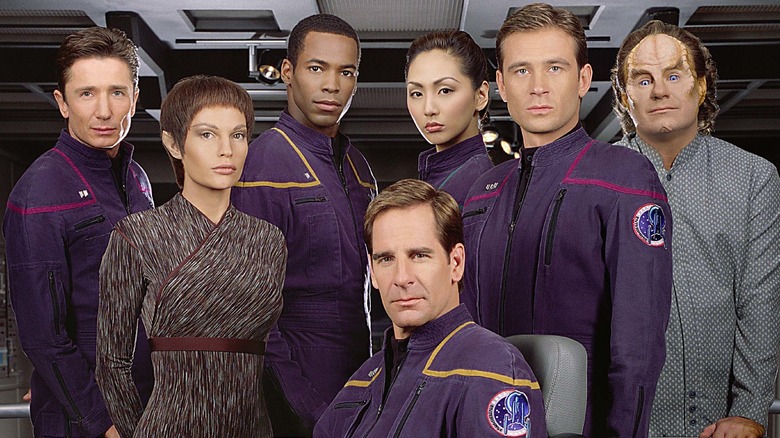
"Star Trek: Enterprise" — originally just called "Enterprise," – was once considered by many Trekkies to be the black sheep of the pre-Abrams era. While it still had many of the same creative people working behind the scenes (the show was created by longtime Trek honchos Rick Berman and Brannon Braga) it deliberately struck a different tone, exploring the early, raucous days of Starfleet: before the formation of the United Federation of Planets, before the writing of The Prime Directive, way back when there was only one Earth ship trekking through the cosmos. The goal was to create a Trek show that was less anodyne than its predecessors, recapturing some of the frontier spirit occasionally seen in the original 1966 TV series.
Other changes included an wholly updated aesthetic; the Enterprise looked a lot more like a submarine than a cruise ship, and the crew wore uniforms that looked a little bit like NASA jumpsuits. There were only two alien species aboard this time: Vulcan first officer T'Pol (Jolene Blalock) and the genial Dr. Phlox (John Billingsley), playing the previously unseen species of Denobulan. Additionally, the traditional orchestral opening of the previous five Trek TV shows was replaced by a truly, truly awful Rod Stewart ballad called "Faith of the Heart" a.k.a. "Where My Heart Will Take Me," sung by Russell "The Voice" Watson , written by Diane Warren, and originally included on the soundtrack to "Patch Adams."
"Enterprise" debuted in 2001 and was met with mixed reactions. Some critics, if recall is to be trusted, positively praised its production value and novelty, while others missed the reliable Trek iconography.
It's Been a Long Road...
When it debuted in September of 2001, "Enterprise" struggled almost immediately. Fans weren't taking to the show in the same way they took to "Star Trek: Deep Space Nine" or "Star Trek: Voyager" as it was set in a new time frame which required a new push for audiences to refamiliarize themselves. What's more, it was the only Trek show on the air at the time, with "Voyager" having ended its run in May of the same year. Previous Trek shows had been doubling up, and it was the first time since 1993 there weren't at least two "Star Trek" shows on the air at the same time. "Enterprise" had a lot to prove.
Some of the early story arcs didn't play well to mythos-minded fans, and the Temporal Cold War story, featuring an evil species called the Suliban , is rarely brought up in conversation I have with other Trekkies. A little more attention is given to the Xindi who, in a story arc beginning in season 3, destroyed Florida in what was very clearly a 9/11 metaphor. Yes, check again the month and year of "Enterprise's" debut.
"Star Trek: Enterprise" season 4 introduced more multiple-episode arcs, and "Star Trek," along with most TV shows at the time, began to evolve into longer-form stories and season-long arcs rather than stand-alone mini moral dilemmas that had been Trek's stock in trade for decades. But the change was too little, too late, and "Enterprise" was canceled after an inauspicious four seasons. For comparison, "Star Trek: The Next Generation," "Deep Space Nine," and "Voyager" all ran for seven years each.
A pity, really, as some have said (anecdotally) that the show was just finding its feet.
Getting from There to Here
The final episode of "Enterprise" was ... Well, it was an interesting choice. A big part of the appeal of "Enterprise" was its placement as a prequel to the original "Star Trek" series, meaning there was a mild thrill in seeing how certain things would come to be. This was, of course, after the same thing was being done with "Star Wars" starting with "The Phantom Menace" in 1999, but before "Batman Begins" pretty much popularized the "reimagined origin story" as a dominant storytelling trope throughout pop media. All of this is to say that "Enterprise" was meant to tie into what good Trekkies knew was coming in the future.
As such, the final episode of "Enterprise," titled "These Are the Voyages..." (originally aired on May 15th, 2005), had to rush to finally connect series back to the Treks were knew and loved. Enter Jonathan Frakes, Will Riker from "Star Trek: The Next Generation," a series that was set about 200 years after the events of "Enterprise." Rather than merely recite the official denouements of Capt. Jonathan Archer , T'Pol , Trip Tucker , Malcolm Reed , Hoshi Sato , Dr. Phlox , and the memorable, memorable character of Ensign Mayweather , we were given a broader view of "Enterprise" history as seen by William Riker, who was recreating life on the original "Enterprise" via a holodeck some 200 years after the fact.
In "These Are the Voyages...," Riker imagined himself as the hardworking galley chef on the original Enterprise, a character that was often talked about but never seen. As Riker envisioned it, the ship's chef served as a personal confidant to the crew, allowing him to have elaborate one-on-one discussion with each character. He also wanted to talk to the crew of the Enterprise shortly before the original ship was to be decommissioned, meaning the episode was also a flash-forward.
In short: "Enterprise" ended with a 200-year-old recreation of the future events of "Enterprise," as interpreted through the eyes of William T. Riker. The final episode of Trek was Mary Sue fanfic written by a Trek character. This is a nerd turducken of the highest order.
This approach, of course, allowed for a great deal of convenient historical fudging on the part of "Enterprise's" writers. If there was any sort of plot or character inconsistency, a viewer could chalk it up to Riker changing history to fit his own holodeck fantasy. More broadly, it was a comment on how we, as a species, tend to romanticize history, altering our past into heroic narratives and easy-to-consume stories rather than a complex timeline of daily events.
It's Been a Long Time
A bit of editorializing, if I may...
Reaction to "These Are the Voyages..." was largely negative. The inclusion of Riker, not to mention the eventual addition of NextGen's Counselor Troi (Marina Sirtis) robbed the "Enterprise" characters of their moment. While one can easily understand that the show's creators wanted to bring the timeline of "Enterprise" to a meaningful conclusion, skipping ahead in time and treating the show's events like a textbook column for other, different characters makes them feel distant and rarified, rather than exciting and immediate. Mild spoiler : The impersonal and abrupt death of one of the main cast members certainly didn't help either.
If one recalls the ending of "Star Trek: The Next Generation," it was made clear that the adventures of the Enterprise-D would continue — only without us, the audience, being able to see them all. A series needn't definitively conclude if we leave comforted that everything will work out fine for the characters. Perhaps a similar approach would have made for a better final episode of "Enterprise." Please, leave us with comforting send-off that would leave audiences assured that the cast would make it safely into Trek history, even if we don't get to see it.
That second approach would also open up the Trek "expanded universe." That is: Plenty of studio-mandated novels, source books, and speculative fiction writers could fill in any gaps that were left in the narrative. Indeed, given the historical element of "Enterprise," leaving gaps in history would be perfectly appropriate. Sadly, we were left with a final episode of Trek that left a bad taste in our mouths.
Maybe that's why so many audiences embraced the 2009 "Star Trek" feature film. It was an entirely new beverage, but at least it washed away the old one.
Now, where do we rant about the Paramount+ era?

Connor Trinneer tells fans to get over Trip Tucker's death
S tar Trek: Enterprise boldly opted to kill off, arguably, the series' most beloved character Charles "Trip" Tucker in the series finale. For some reason, the writers thought that'd go over well. The show was ending, everyone was leaving the show, this wasn't like it was just Tucker's actor Connor Trinneer leaving the show. Then we'd understand.
Yet, after the backlash to killing off beloved characters on The Next Generation (Tasha Yar) and Deep Space Nine (Jadzia Dax), you'd think that Enterprise would've learned their lesson. Nope. So Trip is dead, we're all sad, but at least Trinneer is on our side, right?
Speaking at an event during the Star Trek Cruise, Trinneer, alongside fellow Enterprise actor John Billingsley, Trinneer got candid with the crowd. As Billingsley, who played Doctor Phlox on Enterprise, MC'ed the event, the topic of Trip's death came up. Surprisingly just about everyone, it was Trinneer who told the crowd to "get over it".
Now, we weren't there, it sounds like it was a more humorous take on the event, but it was one of the worst decisions ever made by the show and it's one that fans still to this day cite as a reason, and often the most major reason, that the show's finale was truly terrible.
Though, we can see where Trinneer is coming from. There's something to be said about closing out a story of a character. He got to ride that wave from the pilot to the finale, and his story is wrapped up nicely and neatly. Until they decide to reboot it in an alternate universe, that is. Now, would Enterprise ever be the backdrop for a Kelvin timeline film? Who knows. With so many rumors it's hard to keep up with them but we're pretty sure the next film won't feature the crew of the NX-01 Enterprise.
And if it does? Well, we'll take Trinneer's advice and "get over it".
This article was originally published on redshirtsalwaysdie.com as Connor Trinneer tells fans to get over Trip Tucker's death .
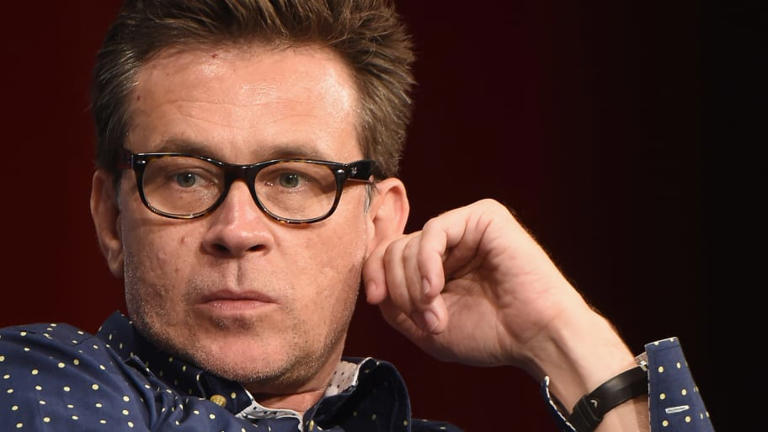
- Cast & crew
- User reviews
- Episode aired Feb 11, 2004

With Reed and Hayes fighting over a training program and Trip seemingly making T'Pol jealous, Enterprise discovers a dying alien in a pod with technology similar to the Spheres. With Reed and Hayes fighting over a training program and Trip seemingly making T'Pol jealous, Enterprise discovers a dying alien in a pod with technology similar to the Spheres. With Reed and Hayes fighting over a training program and Trip seemingly making T'Pol jealous, Enterprise discovers a dying alien in a pod with technology similar to the Spheres.
- David Livingston
- Gene Roddenberry
- Rick Berman
- Brannon Braga
- Scott Bakula
- John Billingsley
- Jolene Blalock
- 10 User reviews
- 4 Critic reviews

- Capt. Jonathan Archer

- Sub-Cmdr. T'Pol

- Lt. Malcolm Reed

- Ensign Travis Mayweather

- Ensign Hoshi Sato

- Cmdr. Charles 'Trip' Tucker III

- Amanda Cole

- Ensign Billy
- (uncredited)

- Ensign Tanner
- Ensign Hutchison
- Private V. Brown

- Starfleet Crewman

- MACO Private E. Hamboyan

- Private S. Money
- Enterprise Sciences Crewman
- Brannon Braga (showrunner)
- All cast & crew
- Production, box office & more at IMDbPro
Did you know
- Trivia This episode contains the first Star Trek female nude scene presented in a sexual context. Numerous episodes of Star Trek: The Next Generation (1987) showed or implied nudity, but in strictly non-sexual contexts (e.g. art classes, nudist living, torture, streaking in protest, etc.), and Who Mourns for Morn? (1998) (which featured Quark being seduced by a lady in a bathtub) came as close as being sensual. This episode aired in the United States on 11 February 2004 during the height of controversy over Janet Jackson inadvertently exposing a breast during the Super Bowl halftime show, on a network owned by CBS (which was taking heat for the incident). As a result, the scene in which T'Pol's rear end is exposed was censored in the USA by zooming in on the scene, and keeping her buttocks just out of frame. Canadian broadcasts, however, were uncensored, as were later DVD and streaming editions.
- Goofs Jolene Blalock 's real eyebrows can be seen curving down under T'Pol's make-up.
[last lines]
Captain Jonathan Archer : You tried to destroy my ship. Why? Answer me!
The Alien : When the Xindi destroy Earth, my people will prevail.
- Connections References Star Trek: Enterprise: Similitude (2003)
- Soundtracks Where My Heart Will Take Me Written by Diane Warren Performed by Russell Watson Episode: {all episodes}
User reviews 10
- CharoleaWood
- Oct 4, 2023
- February 11, 2004 (United States)
- United States
- Official Site
- Paramount Studios - 5555 Melrose Avenue, Hollywood, Los Angeles, California, USA (Studio)
- Paramount Network Television
- Paramount Television
- See more company credits at IMDbPro
Technical specs
- Runtime 43 minutes
- Dolby Digital
Related news
Contribute to this page.
- IMDb Answers: Help fill gaps in our data
- Learn more about contributing
More to explore

Recently viewed
Screen Rant
“he’s mad, angry, sad”: star trek’s connor trinneer felt “very lucky” to play trip on enterprise.
Looking back on his four seasons on Star Trek: Enterprise, Trip Tucker changed a lot and Connor Trinneer enjoyed playing his range of emotions.
- Connor Trinneer reflects on how his character Trip changed throughout Star Trek: Enterprise, particularly during the Xindi arc when Trip's sister passes and he grapples with feelings of anger and sadness.
- Trinneer believes that the context of 9/11 informed the show and his character's journey, allowing him to express and come to terms with the emotions related to the tragedy.
- Despite Trip's death in the series finale, Trinneer was the first to reprise his character in the non-canonical Star Trek: very Short Treks, and there is potential for other Enterprise actors to voice their characters in future animated projects.
Connor Trinneer feels "very lucky" to have played Commander Charles "Trip" Tucker III for 4 seasons of Star Trek: Enterprise , and he essayed the character through many changes. Trip was the Chief Engineer of the NX-01 Enterprise commanded by his best friend, Captain Jonathan Archer (Scott Bakula). Trip was also one-third of Enterprise 's command trio , which included Archer and Subcommander T'Pol (Jolene Blalock), whom Tucker would have a romantic relationship with in Star Trek: Enterprise seasons 3 and 4.
TrekTalks 3 hosted Connor Trinneer in a Celebrity Spotlight panel, which helped raise over $109,000 to benefit the Hollywood Food Coalition. In an interview with Roddenberry Podcasts' John Champion, Trinneer was asked about how Trip changed throughout Star Trek: Enterprise , which ended with Commander Tucker's controversial death in Enterprise 's series finale , "These Are The Voyages..." Check out Trinneer's analysis of Trip's story and how Enterprise reflected 9/11, and watch the TrekTalks 3 video at the 4:35:40 time stamp below:
In the beginning, I was given a number of episodes from which to hang myself. And they worked out, so I knew pretty early on - and I was told this pretty early on - and this is what you want, you want the writer’s room to hear your voice ‘cause then they write for you - and they did. It wasn’t until season 3 when the whole Xindi arc happened where his sister passes. He’s mad, he’s angry, he’s sad, he’s overwhelmed.
I don’t think that you can watch our show, and I’ve said this before, without thinking about that, contextually, that 9/11 informed all of it. And when Trip lost his sister… sometimes acting can be sort of therapeutic. I got to express feelings of how 9/11 had operated on me, and through work, I was able to really come to terms in my own way with what that was. So the change in Trip, I found really satisfying. The struggle, which I think everybody was dealing with, [of] ‘What’s the right thing to do? What do you wanna do right now? Where are you going? Who are you gonna be after all of this?’ And that exploration of him was really satisfying and kind of fascinating to be a part of. I feel very lucky.
Star Trek: Enterprise's 20 Best Episodes, Ranked
Will trip & enterprise's characters return to star trek, connor trinneer played trip tucker again in star trek: very short treks.
At TrekTalks 3, Connor Trinneer heard a familiar refrain from audience members who said they didn't watch Star Trek: Enterprise when it was originally airing from 2001-2005, but they'd come to appreciate the series after seeing it on streaming. With the growing regard for Enterprise comes interest in seeing Trinneer and his Star Trek: Enterprise castmates return in Star Trek on Paramount+. Amazingly, it was Trinneer who was the first to reprise his Enterprise character despite Trip's death ; Connor voiced Trip in an episode of the non-canonical Star Trek: very Short Treks .
Star Trek: Enterprise 's John Billingsley , who played Dr. Phlox, cited the many "issues" with Enterprise 's cast returning for a live-action reunion. For instance, Scott Bakula has moved on from Star Trek and Jolene Blalock has retired from acting. However, there is the potential for Enterprise actors to voice their characters in the animated Star Trek: Lower Decks or Star Trek: Prodigy , just as Connor Trinneer did on very Short Treks . Meanwhile, Connor Trinneer co-hosts the very successful Shuttlepod Show podcast, where he interviews fellow Star Trek luminaries and keeps the flame of Star Trek: Enterprise alive.
Star Trek: Enterprise is available to stream on Paramount+.
Source: TrekTalks 3
Remembering ‘Star Trek: Enterprise’s Much-Maligned Finale, 15 Years Later
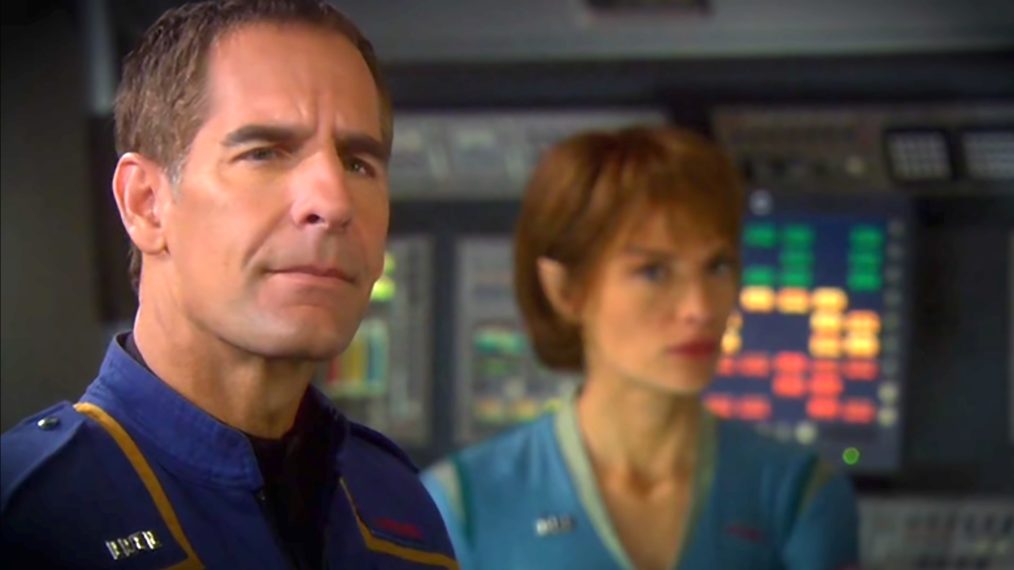
Between Star Trek: Discovery , Picard and the newest forthcoming Star Trek series , all on streamer CBS All Access, it’s a wondrous time to be a Trekker. Fifteen years ago, however, it seemed the sci-fi franchise was ending on a sour note, leaving the airwaves for the first time in 18 years with the series finale of Star Trek: Enterprise , which turned out to be an episode many fans and critics flat-out hated .
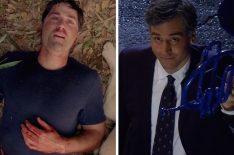
7 Most Frustrating TV Finales (PHOTOS)
“These Are the Voyages…,” the series’ 98th episode, written by Enterprise co-creators Rick Berman and Brannon Braga, aired on May 13, 2005. It opens with Capt. Archer ( Scott Bakula ) piloting the Enterprise (the NX-01) home to Earth in 2161 for the ship’s decommissioning, while gearing up to give a speech at the signing of the Federation Charter. But when the voice of Star Trek: The Next Generation ’s Commander William Riker (Jonathan Frakes) freezes the story, viewers realize that the Enterprise ’s final journey is just a holodeck simulation.
In fact, it is the year 2370, and Commander Riker—troubled by the events of the TNG episode “The Pegasus”—is revisiting the events of the year 2161 at the urging of TNG ’s Lieutenant Commander Deanna Troi (Marina Sirtis).
Riker watches as Archer, en route to Earth, gets roped into a rescue mission that ultimately claims the life of Commander Trip Tucker (Connor Trinneer). Through these holodeck visions, Riker finds inspiration for how to proceed in the Next Generation timeline.
Indeed, the holodeck contrivance and the nostalgic appearances of Riker and Troi turned off fans and critics alike. “That framing story, which is a self-serving epitaph on the part of TNG producers Berman and Braga, doesn’t do the Enterprise cast justice,” Sci Fi Weekly ‘ s Patrick Lee said at the time. “It reduces them to the status of lab rats, and Riker’s supercilious observation is condescending … It’s not surprising that the epilogue for the weakest Trek series ended up so anticlimactic.”
“For the first time ever in Trek history, a series ends with holographic versions of the real characters fans spent years following,” Phil Pirrello wrote for a Hollywood Reporter retrospective last month. “It’s shocking how much wrong they managed to pack into one normal-sized episode of television.”
Fan reactions at the time ranged from neutral to negative. “That’s how Trek comes to an end after a run of 18 consecutive years—with a somewhat ponderous whimper that still manages to show its self-affection,” fan reviewer Jamahl Epsicokhan wrote after the episode aired. “Maybe too much misdirected affection for TNG . And not enough for the characters we’ve been watching for the past four seasons.”
Commenters on Epsicokhan’s post, however, weren’t so charitable—and expressed vitriol toward Braga and Berman. “It was just a total mess,” one wrote. “Why bring back two TNG characters? Why kill off Trip? Why set it years after the previous episode? The blame lies in the people who wrote the episode, responsible for [ Enterprise ’s] failure in the first place.”
Wrote another, “What exactly did the cast of Enterprise do to deserve this finale?”
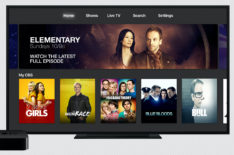
New Look, New Name: What to Know About CBS All Access' Rebranding
Perhaps some of the cast members were wondering the same thing. Jolene Blalock, who played Vulcan Commander on the show, called the finale “appalling” in an interview with the Toronto Star . Anthony Montgomery, a.k.a. Ensign Travis Mayweather, told TV Zone Special , “I feel there could have been a more effective way to wrap things up for our show as well as the franchise as a whole. It just seemed to take a little bit away from what the Enterprise cast and crew worked so diligently to achieve over the past four years, do you know what I mean?”
For his part, Frakes admitted in 2008 that “everybody probably” feels the episode was a disservice to Enterprise . “The theory was it was a valentine to the fans,” he added in an IF Magazine interview, “but the reality is it was a bit of a stretch to have us shut down their show.” (Less than a year later, he said the episode “stinks.” )

What Patrick Stewart, Kelly Clarkson & More TV Stars Are Doing While Staying Home
Braga defended the episode at the time , but at a 2017 panel at the Star Trek Las Vegas convention, he gave fans a mea culpa . “I thought it was the coolest thing ever when we were writing it, the idea of doing a ‘lost episode’ of The Next Generation , but they’re going to the holodeck to look back at Enterprise ,” he said at the time, per TrekMovie.com . “Rick and I thought was a great sendoff to Star Trek , and it didn’t work out so well … It was a kind of a slap in the face to the Enterprise actors. I heard it from everybody. It was the only time Scott Bakula was ever mean to me. I regret it.”
Even a transcription site prefaces its “These Are the Voyages…” transcript with a warning: “Transcriber’s note … Worst Trek Episode Ever!”
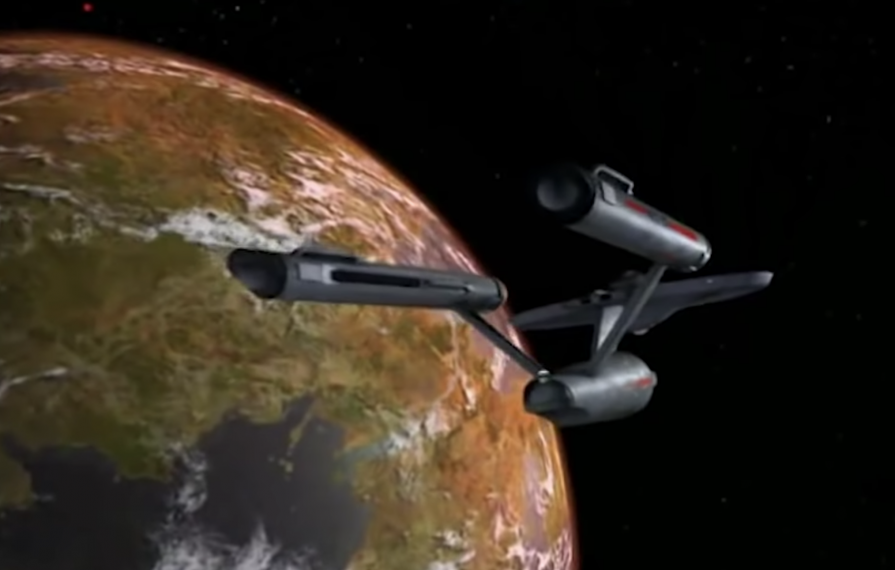
Luckily, writers Roberto Orci and Alex Kurtzman and producer J.J. Abrams reinvigorated the franchise with the 2009 film Star Trek , which honored the original story while finding a new “final frontier” in an alternate timeline—and kicked off a $1 billion big-screen trilogy. And in 2017, the franchise returned to the small screen with Discovery , the first of many CBS All Access Star Trek series on the air or in the works.
Now that “These Are the Voyages…” isn’t the last story Trekkers will get from the franchise, perhaps they’ll come to view the episode as Sirtis did in 2005: “a good episode” but not “a good last episode.”
What did you think about the Enterprise series ender? Let us know in the comments below.
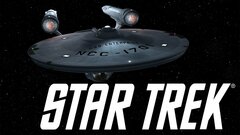

Star Trek where to stream
Star Trek: Enterprise where to stream
Star Trek: The Next Generation where to stream
Star trek: enterprise, star trek: the next generation, anthony montgomery, brannon braga, jolene blalock, jonathan frakes, marina sirtis, scott bakula.


- April 23, 2024 | THEORY: Did ‘Star Trek: Discovery’ Finally Resolve The “Calypso” Mystery?
- April 23, 2024 | The Fight Against The Space Parasites Isn’t Going Well For B’Elanna In Preview Of ‘Star Trek: Defiant’ #14
- April 22, 2024 | Preview ‘Star Trek: Discovery’ Episode 505 With New Images, Trailer And Clip From “Mirrors”
- April 22, 2024 | Podcast: Armin Shimerman, Kitty Swink, Jonathan Frakes & Juan Carlos Coto—Trek Against Pancreatic Cancer
- April 21, 2024 | Interview: Sonequa Martin-Green On Facing Her Past On ‘Star Trek: Discovery’ And Her Hopes For The Future
Connor Trinneer: Enterprise Didn’t Kill Star Trek Franchise
| August 11, 2011 | By: TrekMovie.com Staff 252 comments so far
Trinneer: Enterprise didn’t kill franchise
Star Trek: Enterprise’s Connor Trinneer spoke to the official site about his time as Trip Tucker on the NX-01. Here are some excerpts.
Trinneer on what he would have liked to do with Trip if Enterprise had a fifth season:
I think that they would have explored that relationship with T’Pol more. I think there was a lot to harvest in that one and I think you would have seen a lot more of that. There probably would have been more of this evolution of that Vulcan-human relationship and maybe them trying to have children.
Trinneer on the controversial Enterprise finale “These Are the Voyages”:
I was totally satisfied with it. I know other people weren’t, but I was satisfied with it as an actor because there was a lot to do, a lot going on. They were talking about their feelings about that character and all that. I know that people had their opinions about bringing in The Next Generation people. Hell, I loved working with Jonathan Frakes and I wished I could have done it more. I loved the guy. I didn’t care in regard to how they were going to sew it up. I was really happy with my involvement as a character in it, if that makes sense.
Trinneer on how some fans think Enterprise “killed” the Star Trek franchise by being cancelled and ending 18 years of Star Trek on TV:
Responsible for any demise? I think that was nonsense. When you look back on it, all of the shows took a couple of years to find their sea legs. And I think, absolutely, we got our sea legs. Is there an argument that you can only go to the well so many times? Absolutely. It’s also an argument I’d agree with. How many years in a row can you keep it going? We happened to be the show that, for whatever reason, they said, “Stop.” They were expensive. They were all expensive. But in terms of what we did and what we accomplished, I think everyone involved with it, myself included, has nothing but pride for what we did and we hang our hat on that.
Read full interview at official site: here and here .
POLL: Did Enterprise Kill Trek on TV?
With the cancellation of Star Trek Enterprise the franchise ended a 18 year run on TV. So was it inevitable, or do you think a different show could have kept the Trek franchise going?
I personally loved Enterprise AND its finale.
I wish that Enterprise continued for 3 more years. Enough said.
Hated the final episode but loved Enterprise.
What alternate universe are you living in to say that there will never be another Trek series? Hell, even when television is a distance memory, Trek will exist on what medium we use to pass on great stories to our kids. Trek has become part of our human conversation. It ain’t dead.
Enterprise killed Trek on TV. But it wasn’t alone. Voyager, apathetic writing, and over saturation played huge parts.
“distant memory, Trek will exist on whatever medium we”
jeez, I wish we could edit our own posts.
Part of the biggest problem with the “demise” of Trek on TV was the move from a major broadcast network to UPN during Voyager’s run. Major portions of the country couldn’t easily get UPN and that, coupled with sub-par writing and episodes toward the end of Voyager, played more of a roll than Enterprise did. Enterprise was fresh, bold, exciting, and brought new-life to a tiring franchise…it just wasn’t in time to save the sinking ship that Berman, and others, had caused. Enterprise would have only continued to get better if it hadn’t been canceled.
Voyager killed the franchise on TV — Enterprise didn’t stand a chance.
Enterprise Killed the franchise dead. Continuity out the window. Producers admitted they never watched the original series. Well Mike Sussman apparantly did but it was too late to save the franchise. Better off to reboot the series with the new movie. The only tradgedy being is that ENTERPRISE could be part of the new Star Trek universe too!
I agree with everything he said.
Well said Connor. Agree with everything.
Enterprise was shut down when it was getting really interesting, and it was a time when SciFi was having a bad time on tv.
If it were airing today it probably would have more success.
I think Enterprise like many shows that get cancelled were not appreciated at the time but eventually find their feet in reruns.
I did enjoy it at the time, but had issues with it. Looking back I feel fans could have got behind it sooner.
I will say over saturation of trek on tv hurt the series at the time (along with constantly using the same producers and probably the same writers over and over again didn’t help either). The fact is all shows go through times where there is a lot of hype around them and then, once that hype is finished, the show goes off the air. The Law and Order franchise looks to be going through that now.
Give trek a little bit more of a rest on tv (until after this trail of movies are over) and then look into bringing it back then. Granted, I want to see a new series right now but I also don’t want the series to become over saturated again and have lots of people lose interest in it.
I actually really liked Enterprise, though I may have helped lead to its demise because I never really watched it when it was on (I was in college and just never had much time for TV weekday nights). I’ve learned to appreciate it since then, however
Television is all about ratings, and as such, “Enterprise” did put an end to Trek on tv. So I did have to, unfortunately, vote yes. The third and fourth seasons were outstanding, but by then it was too much, too late.
“Voyager” in my opinion, was the bigger disappointment and “Enterprise” paid the price for that.
But “These Are The Voyages…” ended up being the final insult. Let’s make sure that episode isn’t known forever as the last ever Trek episode.
It was terrible as a TV series, let alone as a Star Trek show. There was some truly horrible writing going on, and to top it of, some truly terrible acting aswell. Off course he’s gonna be in denial, as he was part of the problem.
I loved Enterprise, particularly the third season.
I was OK with suggestions to “wait until the movies are done” apart from the fact that they’re being stretched out FAR too long.
I’d much rather see Trek on the small screen, on a regular basis, than see it a couple hours every 4-5 years.
Did it kill the Star Trek franchise? .. . . . That’s an awkward question. When I watched Voyager, I saw a lot of ridiculous episodes that I didn’t care for, but I still came back and ended up watching the entire series from it’s start to it’s end. With Enterprise, I wasn’t that interested.
I guess it has to do with the series trying to be an origin story to every other Star Trek series that came before it. Nothing really exciting about that since we know nothing bad will ever happen. But what really turned me off was how rude these characters were to each other. Everyone acted like a jerk towards each other, and from the reviews I’ve watched from SFDEBRIS, it didn’t get much better. Condemning a whole race to die simply because of crappy evolution, and the moral of the story is that they didn’t come out here to play god?
But I will give the series this. When they have a linguistics expert named Hoshi onboard, and the crew are being contacted by an alien race (The Romulans) who speak a language they don’t understand, she actually translates their language from scratch so the crew can understand it. WAY better care for the characters than Uhura from Trek09 who’s just there for…. I don’t know. Make out with Spock because JJ likes that stuff I guess. She also gets bonus points for wearing a full uniform that has the same amount of clothing as her her male colleagues’ uniforms and is not romantically involved.
Yeah. I’m not going to say that Enterprise killed the franchise as a whole, it just killed itself as a series. Worse comes to worst, I can stand by Star Trek: The Motion Picture and Trials and Tribble-ations to say that Enterprise didn’t happen. All they had to do was not name the darn ship Enterprise. :)
I really miss Enterprise. It was getting to be so good when it was cancelled.
I also think TV changed a lot since the Next Generation was in its heyday and an expensive show like Enterprise wasn’t as sustainable any more. Plus it didn’t benefit from syndication to the extent of previous Trek shows did, and was stuck on a dying station like UPN.
Definitely count me as an Enterprise fan. I had a few issues early on, but for the most part I found it to be an entertaining and plausible precursor to all we hold dear.
I loved Enterprise, but hated the finale. That was just insulting. Trip’s death served no purpose whatsoever. And no, I don’t think it killed the franchise. I completely agree with Connor.
Oh, and I loved the characters. The actors who portrayed them did a very good job of making them colorful and interesting.
Mayweather…not so much I guess.
Also, the potential problems from putting a new Trek series on the air right now don’t involve over-saturation of Trek, but is more about when to air the show and on what network. I can’t see CBS airing it, or selling it to a rival. I’m also not sure it would get enough exposure in a sea of reality and talent shows. Could get lost in the shuffle. There are plenty of talented writers out there. Quality wouldn’t be the problem, logistics would be.
ENTERPRISE didn’t really “kill” Trek (Voyager and Parmount’s general overstaturation of the franchise lended a lot to it), but I think it’s fair to say it was the final nail in the coffin.
No, Enterprise didn’t kill Star Trek- putting Les Moonves in charge killed Star Trek and left it on life support waiting for someone to come and make it all flash and no substance. Cut to 2009. Star Trek is back… sort of.
DS9 and Voyager killed Trek!
I watched every episode, loved the show. It wasn’t the show that killed the franchise, scifi on major network stations (which UPN was pretending to be) just don’t stand a chance ratings wise.
I have to admit I didn’t like Enterprise at first but I was really enjoying it by the fourth season when they had mostly two or three part episodes. I wish they had kept that up for the full seven seasons that the other shows had (or even ten seasons and have it finish with the birth of the federation). As for the last episode I actually really liked it. I felt that it was a good way to say goodbye to both Enterprise and Star Trek in general… at least a goodbye for now hopefully.
Oh no show killed Trek. It was a temporary halt due to fatigue. Trek series was not best show for the prime time/channel, starting with TOS. It just have perpetual audience. I became a big Trek fan from theater showing of ST IV, but hardly ever watched brand new episode on TV live from TNG onward. Only re-runs.
With that said Enterprise is the only series that I go back to re-watch more than 5 times in entirety in the last decade besides the movies. All other series I only picked a subset. That speaks loud for me.
I don’t think that Enterprise killed trek on TV. I think the network was at least partly to blame. I think that UPN which is now CW was shifting to a different demographic and Enterprise really didn’t fit with them. It would have been interesting to see how Enterprise would have fared on a different network.
With the fourth season Enterprise was really beginning to find it footing with Manny Coto heading the writing department. If they had brought him in earlier I Think that Enterprise would have had a better chance of jumping the shark.
But I do believe that Star Trek will be back on TV it is only a matter of time.
A lot of what killed the Trek franchise on TV (so far, at least – maybe there will be a revival someday) had nothing directly to do with Star Trek, either Enterprise, Voyager, or any other particular version. This was also the period when so-called “reality” TV (which is, of course, anything but) began to take over the airwaves on broadcast and cable (Top Model, Project Runway, chef shows, Queer Eye, Deadliest Catch, and on and on and on and on and … ) Come to think of it, the same thing is killing the History Channel! Think about it: much cheaper to produce, bigger audience, better bang for the advertising buck for Paramount or any other studio. The era of the hour-long serialized TV drama is slowly coming to an end. The arrival at Paramount of a lot of front-office executive “suits” who didn’t know much or care much about or understand Star Trek also did its bit (Scott Bakula has commented on this in prior interviews, as has the unfairly dissed Rick Berman). Yes, the golden goose was overused. That did play a big part. But there were other things going on in the background that came down to cutting costs.
UPN killed Trek, end of story. The Augment arc, the Affliction / Divergence arc and lastly, the In A Mirror Darkly arc was some of the best Trek that ever got made, hands down. And no one can deny that.
It bugged me, geeky detail guy, that it was visually still a lot like DS9 and Voyager — the uniforms had the same shoulder patches as those future uniforms, the catsuits, the ship — it felt like they weren’t even really trying to acknowledge what came before, they were making yet another version of TNG.
And, heck, couldn’t they have called the ship something else? The Enterprise-worship has become a bit silly. Surely other ships made a difference. And name/brand-recognition didn’t actually do the show any favors.
I think that Paramount killed the franchise. One of the reasons why Enterprise failed was that it was on their network versus being syndicated like TNG and DS9 were. I know that I never really got to see those episodes of Enterprise when it was on the air because I did not get the UPN network. Another thing was that how many different shows did they need to make? The TNG cast was actually contracted to do 8 seasons, but Paramount decided to make Voyager and send TNG to the movies. Honestly, TNG still had strong legs to it even after 7 seasons (I think it was nominated for an emmy for best dramatic series), but because of the “wisdom” of Paramount sent them to the big screen where it utterly failed with the exception of First Contact. Maybe it was a warning sign/turning point of the franchise when they decided to kill Kirk off for really no good reason in my opinion. DS9 was a great show, but I think for the first couple of years it was stuck in TNG’s shadow, and fans didn’t catch onto it right away, and I think that starting up Voyager during DS9’s run started the downward spiral that ultimately culminated in Enterprise really failing to get off the ground; and in reality, the UPN network really just stunk, and I don’t even think it exists today. I think Paramount should have realized that they were going into the well too many times in terms of TV, and that having their own network instead of syndicating like they did with TNG and DS9 was eroding the franchise. Ultimately, Enterprise was more of a victim than a reason why the franchise is no longer on television.
Is there any hope of a return to Star Trek?
I really loved Enterprise, btw.
All of this IMHO: There will never be another live action Star Trek on TV. Why? The economics have changed. There is no network, including CBS, that can afford to invest the huge production budget numbers to make a JJ-type ST series. Ratings across all networks now are a fraction of what they were in the TNG days. Even Terra Nova stands very little chance of making back its $4M/ep costs and will likely crash and burn at 13 eps or less since America (as a whole) does not watch scifi of any kind. With the bulk of syndication of ST limited to primarily English-speaking countries, no one at CBS is crazy enough to toss away tens or even hundreds of millions of dollars on an ST series which will never break even.
if they hadn’t have done season 3 it would have continued and hopefully we would have seen the romulan war! oh well, the books are awesme!
Although I didn’t watch any of the first run episodes until the last 5 or 6 episodes, I have to say in reruns and DVD I have really come to enjoy this show quite alot. I think they really got alot of unfair bashing over the years, and I wish the series HAD continued to develop over time. Certainly just as good as some of the other “modern era” Trek, and waaaaay better than Voyager, IMO.
I believe that Trek will return in 2016. It just needed a few years off the small screen to calm down and reset.
It was the continuing conveyor belt of Star Trek shows being churned out from Paramount that caused the franchise to “Burn Out”… GREED is the cause for Star Treks demise on television, not the shows themselves.
Paramount and CBS wanted to grab as many viewers as possible and make lots of money in the proccess instead of just allowing one show to run at a time and allow for the natural evolution of the Star Trek universe…
Having said that… I believe that TNG and DS9 went together nicely, however Voyager should have been held back until DS9 had finished for at least a year or two… then start Voyager with a decent episode on DS9 as a pilot episode, just to say goodbye to DS9 one last time and move on with the franchise…
The films aswell probably made little sense as there were so many series going on, but we were still rolling with the TNG crew… perhaps they could have capitalised on having more than one captain in the movies, or made the movies and series link or something…
STAR TREK WILL RETURN IN 2016… I guarentee
So what ALMOST killed Star Trek? If its not enterprise, then what?
I voted NO!!!> Ebterprise was a great show and it’s 4th season was fantastic. Only wish they could have gone at least 2 more.
I went and bought the Enterprise series four and to this day is the only complete star trek series from all the shows that I put my cash on. I have a lot of the original series DVDs and the Fan Collectives but not a complete series as such. That season was the best of times, not the worst of times. Did not get the show in its initial run, me being from the Caribbean island of Trinidad but got the reruns on SciFi and religously watched all four seasons. Long live Trip I agree the last episode sucked Harry Ballzzz.
Enterprise killed the franchise? The hell it did, far from it. I love ENT and think in years to come it will be rediscovered and appreciated alongside the rest of the series.
Loved all the Star Trek series except for maybe Voyager but even it had its moments.
ENTERPRISE was a darn good show. Could it have been better earlier on? Yes. The show had really found it’s legs in that last season. Manny Cotto did an exemplary job as the show runner. We would have had some great TREK ahead of us if it had survived for future seasons. Too bad that we’ll never get to see it.
Enterprise didn’t kill trek on TV. Berman and Braga stayed too long and should have had Manny Coto and Mike Sussman take over the show from the beginning. New and free lance writiers should have been allowed to submit story ideas. An example is DS9, Berman and Braga had very little involvement in the day to day running of that show and most fans thought it was well done.
Voyager killed Trek on TV for me — in 2001, I was just completely burned out on Star Trek. I watched the pilot for ENT, liked it, but just had other priorities. I didn’t even know ENT had been cancelled until 2007, when I decided to catch up and see how the show was doing.
Now I’ve seen the whole show and (even including the first two seasons), it’s tied for my favorite Trek series with TOS. I really wish I’d given it a chance while it was on the air.
And agreed with those who don’t expect any Trek TV any time soon — until VFX gets a lot, lot, lot, lot cheaper, no network’s going to lay out the millions-per-episode for a big sci-fi show when they can get similar ratings for comparative pennies with America’s Top Shiniest Objects.
Hell, even Lucas can’t get a network to cough up for his Star Wars TV show, and that’s pretty much guaranteed to pull in a viewer or two.
I admit I was a little aprehensive about Enterprise. I had the assumption that they were trying to destroy what had already been established in other series based hundreds of years later. I questioned how this other ship named Enterprise existed without the slightest mention of it 200 years later, even though Kirk was mentioned on multiple occassions & Archer was a major player in the founding of the Federation. It took time, but I came to appreciate Enterprise like the other series and I was dissapointed that it ended prematurely.
Was Enterprise responsible for killing Star Trek? Absolutely not. They never stood a chance. Being used to 24th Century treknology and storys, moving back to 22nd century stories seemed a poor choice, just one of many that were made years prior in DS9 and Voyager. As I watch old episodes of all the series on DVD I do see many parallels too between episodes on different series. As if the basic storylines / principles were taken, and simply rewritten for the different characters rather than brand new material. (Which I suppose is to be expected, you eventually run out of material after 18 years)
I would sort of agree with Trip and disagree. To an extent, he’s right, I don’t think the show itself killed the franchise, it was already in decline before Enterprise even started. I just think people were same of the same types of stories and writing and wanted something new, and they weren’t getting it. That is what almost everyone was saying during Enterprise’s run. We were promised something different than the other series. There’s no reason it couldn’t have been…but what we got was more like a Voyager 2.0. The biggest failing of Trek TV is when Star Trek stopped telling stories that related to real-life, something it had done well in TOS, TNG and DS9, and it started just being about telling Star Trek stories.
Stargate is also going through a lull after being on nearly as long as TNG and its spinoffs were (15 years, 17 seasons) and I would argue the same thing about Stargate. SGU did not kill Stargate, in fact SGU was a great show IMO. But like Trinneer said, sci-fi is expensive. We learned that with SyFy’s recent cancellation of Eureka, despite the series being the #2 (sometimes #1) highest rated drama on the network. Stargate’s strength is in being set in our own time and being about US vs. Star Trek’s strength – being in the future and telling stories that relate to real-life events.
I think a big failing of both Voyager and Enterprise was compared to the other Trek series the character were very two-dimensional characters. It felt more like they were there to serve the stories, rather than the stories being there to serve them. In almost any regular story those shows did, you could pretty much replace one character with another and still tell that story.
Another thing that I think served as the demise of Enterprise is back in the 90’s when Trek was running there really was not much in the way of Sci-fi competition, except for a couple shows it was basically the only place for us sci-fi fans to get our fix. Around the early 2000’s is when the genre kind of exploded and you started seeing more shows pop up, from Smallville and Battlestar to Firefly and Farscape and Stargate SG-1.
Still, I’ve loved all the Star Trek and Stargate series, and in their worst moments both series are far better than just about anything else you could find on TV. Trinneer is also a fantastic actor and one of the best things about both Enterprise and Stargate Atlantis.
Scenes Star Trek Actors Regret Filming
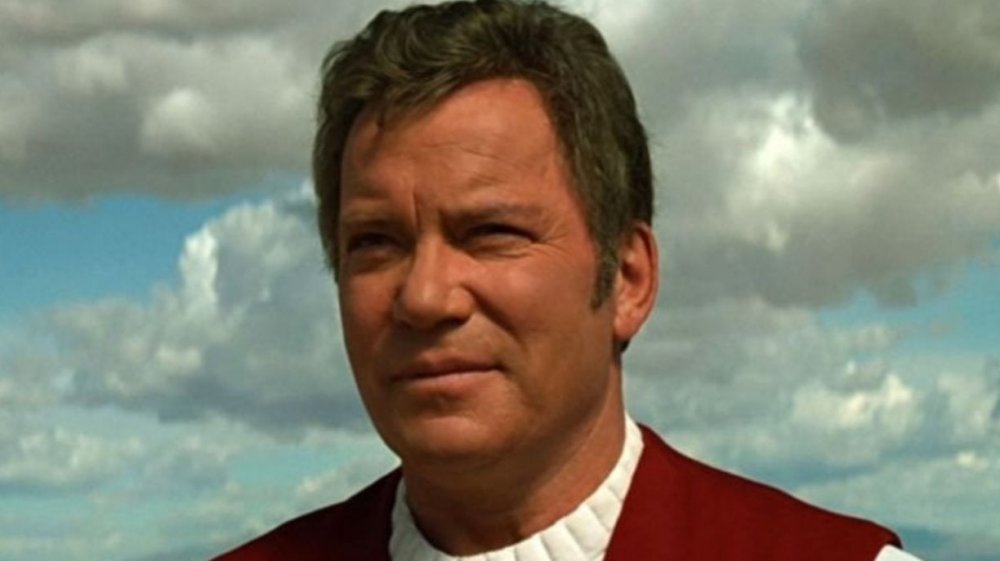
Star Trek can tell us wonderful things about the human condition. It can also be deeply, deeply embarrassing for both fans and the cast. On sheer volume alone, it makes sense that many episodes would be mediocre to bad, but some transcend that. Some caused the actors to silently protest. Others made the cast worry that they'd never live it down. And many are ones that all parties involved — cast, crew, producers, and fans — wish they could forget.
Though cast members may be reluctant to badmouth the show that's paid their bills for years, a few have talked about the Star Trek moments that evoke shame or confusion. A few were only there for a movie or even just one episode. Many others are lifers almost synonymous with the franchise. And thanks to the relentlessness fanbase, the convention scene, and intrepid journalists, we have answers to these shameful questions. Here are scenes that the Star Trek actors regret filming.
Jonathan Frakes truly regrets that Enterprise finale
Few people have been in more Star Trek projects than Jonathan Frakes as William Riker. This means, despite all the wonderful memories, the actor remembers a whole lot of bad moments. After all, Riker has many an ignoble scene, from becoming a himbo in the Next Generation episode "Angel One" to his time seducing the Space Irish in "Up the Long Ladder." Frakes himself called "Code of Honor" a "horrible racist episode" and allegedly tried to get it pulled from syndication.
However, the scenes he regrets the most aren't in The Next Generation . Instead, they come in his one-episode appearance in Enterprise , where he provided the framing story for the series finale "These Are The Voyages." He's admitted that his presence was a disservice to the regular cast of the show, as Riker permeates the episode, appearing at dramatic times that should belong to other characters. For example, when Trip is dying, the camera keeps panning to Riker, who's watching in the background. Even the last line of dialogue in the entire series is spoken by Riker — not Archer, not Tucker, not even T'Pol ... but Riker.
Frakes has called it an "unpleasant memory." Sure, he was delighted to work with Marina Sirtis again, but that was a small consolation for an awkward situation. "They said it would be a Valentine to the fans," Frakes said (via High-Def Digest ), "but all of it ended up doing I think was hurting Scott Bakula's feelings." Bakula himself has never spoken about the finale, but writer/producer Brannon Braga called it "the only time Scott Bakula was ever mean to me," so tensions were there.
Malcolm McDowell isn't crazy about Kirk's death scene
Malcolm McDowell played one of the most important villains in Star Trek history. As Dr. Tolian Sora in Star Trek: Generations, he was the force that united Jean-Luc Picard and James T. Kirk. He was also the man who, via weird bridge collapse, killed William Shatner's beloved character. While McDowell relishes being known as "the man who killed Kirk," he regrets how the scene went down.
In an interview with StarTrek.com in 2011, McDowell was asked what he thought about Kirk's death. He did not hold back. "If you have – which they had – this icon of American television, why the hell didn't they give him a spectacular death? Why did they give him such a really paltry death? Me shooting the bridge out or some BS whatever it was? They should have sent him off in a glorious fashion, and they didn't."
The scene originally had Soran shoot Kirk in the back before reshoots. McDowell also found this disappointing, and he lamented that they couldn't "have seen Shatner off in a big way." More than anything, he considers it a wasted opportunity. As he explained to Metro ( via io9 ), "It was feeble, I thought, because I thought he deserved better."
Leonard Nimoy was embarrassed during this Star Trek episode
As Spock, Leonard Nimoy was there for many of Star Trek 's greatest moments. It's easy to picture him performing a Vulcan nerve pinch or explaining how the needs of the many outweigh the needs of the few. But he was also front and center for one of Trek's worst hours, "Spock's Brain," an episode that was deeply embarrassing for him.
Though it aired a half century ago, perhaps no episode has come to symbolize Trek at its worst more than "Spock's Brain." The episode sees Spock's brain surgically removed and kidnapped by an alien species. Vulcan physiology lets their bodies stay alive for 24 hours without a brain, so Kirk goes hunting for it. Even for '60s sci-fi, that was a bridge too far.
In his autobiography I Am Spock , Nimoy singled it out as a particularly painful memory. "Frankly, during the entire shooting of that episode, I was embarrassed, a feeling that overcame me many times during the final season of Star Trek ." It's worth noting that the final season also includes Spock jamming with space hippies, which he's never mentioned, but it isn't one of his finer moments, either.
There are two Star Trek moments that make Avery Brooks cringe
Though Deep Space Nine is considered the gritty Star Trek , it still had a fair number of foolish moments. These even included some from no-nonsense Benjamin Sisko. When asked what his least favorite scenes were, Avery Brooks said it was a tossup between two choices.
The first was in "Move Along Home," specifically the scene in which he and his crew had to sing a song and play space hopscotch to get past a door. "There's nothing wrong with the melody," he said. "It's the hopscotch part." He knew right away that he'd never live it down and jokingly said he's glad he didn't go home to Gary, Indiana, right after that.
The second was "Apocalypse Rising," in which he played a Klingon. This involved enough prosthetics that it necessitated a dentist appointment. But while he didn't want to do it, Brooks had no choice — it was "pay or play" — but he wants fans to know that he didn't like it. As he put it, "The resistance you observe with Sisko playing a Klingon was real ."
William Shatner has some strong opinions about Kirk's farewell
William Shatner has spent more time than anyone as the face of Star Trek . And when you're the head honcho of the USS Enterprise , this comes with many great moments, but it also comes with many deeply embarrassing ones. Some of these were a product of the time period. Others were a product of Shatner's own ego. But the scene he publicly regrets most is his final scene.
Star Trek: Generations ends with Captain Kirk's death, one that never quite sat right with fans. It never quite sat right with Shatner, either. When asked by Crave Online whether he was satisfied with Kirk's death in Star Trek : Generations , Shatner said, "No, no, I would have done something else."
According to Shatner, the suits at Paramount figured the Star Trek franchise might make a lot more money (hopefully $200 million) if they included the Next Generation cast . They also allegedly reasoned that there wasn't much milk left in the Original Series cash cow. So it was a perfect time for Kirk to meet Picard. However, the filmmakers also realized they needed to up the stakes by killing off a character in Generations . And specifically, they wanted to kill James T. Kirk.
So as Shatner explained to TrekMovie.com , he was presented with two options. "It was either I was going to appear and die, or they were going to say he died. So, I chose the more practical of the two." This led to his ultimately unremarkable death scene, where his death is less "noble sacrifice" and more "bridge collapse."
Between the lackluster box office — which hit $118 million, meaning they didn't even break their ceiling — and the pathetic death, Shatner wasn't happy. "I wish," he said, "that there had been more trumpets for the death of the character.
Alexander Siddig absolutely hated a certain DS9 storyline
Dr. Julian Bashir received some backlash during Deep Space Nine 's early days. He was seen as boring, brash, and worst of all, kind of annoying. But while the producers had a plan to make him more interesting, this blindsided actor Siddig El Fadil, who now goes by Alexander Siddig. It started a storyline that he had no say in and wanted no part of, and in fact, he eventually forced the regretful storyline to stop.
"Dr. Bashir, I Presume?" reveals that Bashir was genetically modified as a child, which made him much smarter. But Siddig didn't learn about this plot development until the day before shooting. He was upset that the producers wouldn't go over a major character arc with the actor actually playing the character. This was, in his estimation, a response to the character's unpopularity and an attempt to turn him into another Data.
"I did it the only way that an actor can," he said to TrekMovie.com , when asked how he coped. "I completely destroyed the lines that they gave me regarding the situation." He tanked the storyline, putting no effort into it. One time he "pinned the lines to the back of someone's shoulders" to read them. He also "pinned them around the office as if they were lines needed for daily modification." The producers eventually got the literal and figurative memo, and the story was phased out.
Connor Trinneer majorly regrets his death scene
Though Enterprise is by and large considered a malign part of Trek 's history, fans still have an affection for it. And few characters from the series get more love than Trip Tucker, played by Connor Trinneer. Tucker was front and center for some of the show's best moments, such as dealing with the ethics of cloning in "Similitude," captaining the ship in "Twilight," and getting pregnant in "Unexpected."
He was also there for one of the franchise's worst hours, Enterprise 's finale, which specifically included his pointless death. And it's been a source of frustration, if not regret.
Trinneer has the same criticisms of "These Are The Voyages" that most fans do. By including characters from The Next Generation , it did a disservice to the Enterprise crew. While it was nice to see Riker and Troi, it meant that the finale was just another TNG episode.
More importantly, Trinneer hates the way Tucker died, nearly blowing himself up to ward off exactly two attackers. He found the death arbitrary and rash, telling Trek Today , "I've gotten out of much worse scrapes than that." Trinneer does count himself as lucky in one way, though — at least he got an ending. As he explained to TV Guide , "I'm the only one who went out with a bang ... no pun intended. I got the goodbye no one else did."
Gates McFadden can't stand that Star Trek episode with the lamp
Every crew member on The Next Generation had a skeptical streak, but few were more grounded than Dr. Beverly Crusher. Spending six seasons as the chief medical officer of the Enterprise demands it. But there's also actress Gates McFadden, who to this day is baffled by what the writers were thinking when they gave her "Sub Rosa."
"Sub Rosa" is often listed as one of the worst episodes of The Next Generation . An attempt at Gothic romance in space, the story — in somewhat reductive terms — involves Beverly falling in love with a ghost inhabiting a lamp. It's worth mentioning that this lamp ghost has also seduced several generations of her family.
As maligned as the episode is, criticism rarely falls to McFadden, who put on a particularly intimate performance without showing anything explicit. That's a credit to her as a performer, and content aside, the nature of the story gave the actress some enthusiasm. She called it "thrilling" to be "outside her uniform" and perform in a more creative way.
Nonetheless, she found the whole concept absurd. The script was written by Jeri Taylor, who some cast members credit with improving the writing for female characters. That seems to have made it more confusing for McFadden. As she explained at the 2012 Austin Comic-Con , "I was reading this, going, 'This woman became a doctor, and she's in love with a lamp ?'"
Armin Shimerman regrets the first time he played a Ferengi
Armin Shimerman is best known as Quark on Deep Space Nine . But years before DS9 was even conceived, he had a part as a Ferengi on The Next Generation . And not just any Ferengi, either, but one of the first ones ever put to screen.
He regrets every second of it.
Star Trek creator Gene Roddenberry imagined the Ferengi as the main antagonists for TNG . They were introduced in "The Last Outpost," just a few episodes into the new series. The Ferengi were meant to be menacing, threatening, and anything but funny. Nonetheless, they came across as comical, and the episode is held in low regard to this day. Their credibility as villains tanked, and they were mostly comic relief until Deep Space Nine . Shimerman blamed himself, telling Gamespot that he "failed miserably" and that "no one one bears the brunt of that mistake more than I do."
So Shimmeman approached Quark as an attempt to salvage the Ferengi. "All of my work on Deep Space Nine , for the first four seasons, was me trying to eradicate that original performance from everyone's mind."
Teri Garr doesn't like talking about her Star Trek appearance
One of the all-time comedic actresses, Teri Garr has played in classics like Tootsie , Young Frankenstein , and After Hours . She also played Roberta Lincoln in "Assignment: Earth," the season two finale of The Original Series . It was one of her first speaking parts, and she later credited it in her autobiography with getting her real roles. That doesn't mean she likes it or even wants to talk about it.
Gene Roddenberry intended "Assignment: Earth" as a backdoor pilot to a new series, hedging his bets in case Star Trek got canceled. Ultimately, Star Trek got a third season, and "Assignment: Earth" remained a standalone episode. But years later, when interviewed for Starlog magazine , Garr expressed resentment towards the role. "I did that years ago," she said, "and I mostly deny I ever did it."
Garr is cagey about why it was a negative experience. Part of it likely had to do with Roddenberry, who was especially hands-on in hoping this would get picked up as a pilot. Producer Bob Justman, in his book Inside Star Trek , theorized that a costuming incident may have played a part. Roddenberry allegedly wanted Garr's skirt shortened to be more revealing.
Whatever happened, it was enough to sour her on the whole franchise and fanbase. She was glad "Assignment: Earth" never launched, saying, "Otherwise, all I would get would be Star Trek questions for the rest of my natural life — and probably my unnatural life. You ever see those people who are Star Trek fans? The same people who go to swap meets."
Garrett Wang has regrets about what could've been
Garrett Wang doesn't openly regret many scenes he played as Ensign Harry Kim. Rather, he regrets the scenes he didn't get to play — namely, any as a senior officer.
Wang still takes umbrage with the fact that Harry remained an ensign throughout Star Trek: Voyager . "I mean, come on people!" he said to StarTrek.com . "Kim was probed, beaten, tortured and held the distinction of being the first Voyager crew member to die and come back to life. What more does a guy have to do to get promoted to lieutenant for frak's sake?" This was made worse by the fact that Tuvok and Tom Paris were both promoted during the series, despite being members of the Maquis.
Wang called writer/producer Brannon Braga during the fourth season to ask why Harry hadn't been promoted. He was told, "Well, somebody's gotta be the ensign." He became so frustrated by this that he even appealed to Kate Mulgrew, Captain Janeway herself, about it. He finds this hilarious in hindsight.
He also regrets that he was never given a chance to direct an episode, saying that he's the first Trek cast member to be outright denied a chance to step behind the camera. Wang thinks the most likely reason for this was an off-the-record comment he made to TV Guide early in the series where he complained that human characters weren't allowed to show emotion.
Jeffrey Dean Morgan didn't enjoy his time on Star Trek: Enterprise
Hold up, Jeffrey Dean Morgan was in Star Trek ? Yup! He appeared as a Xindi-Reptilian in the Enterprise episode "Carpenter Street." You'd be forgiven for missing him behind all the makeup. He'd also prefer you forget about the role entirely.
Circa 2003, Morgan's career wasn't doing so well. He wasn't in a position to turn down work, so he took a role in Enterprise . Little did he know that later he'd consider this his career low point .
Morgan expected some to do some line readings. He didn't expect four hours in a makeup chair over ten days. "I remember them dripping goop on my face," he told Entertainment Weekly , "and I had straws sticking out of my nose. I couldn't eat lunch. I was claustrophobic. I'd go home in tears." The whole process was so miserable he almost quit acting.
He's not entirely cynical about it, though. He acknowledged that "work begets work," and it helped him pay some bills. A job's a job, and without it we'd probably never meet Negan. That doesn't mean he had to like it, though.
- More to Explore
- Series & Movies
Published Mar 19, 2022
Connor Trinneer Finds the Humanity in Horror
The Trip Tucker actor reflects on Enterprise, conventions, and his new series 'The Purge.'
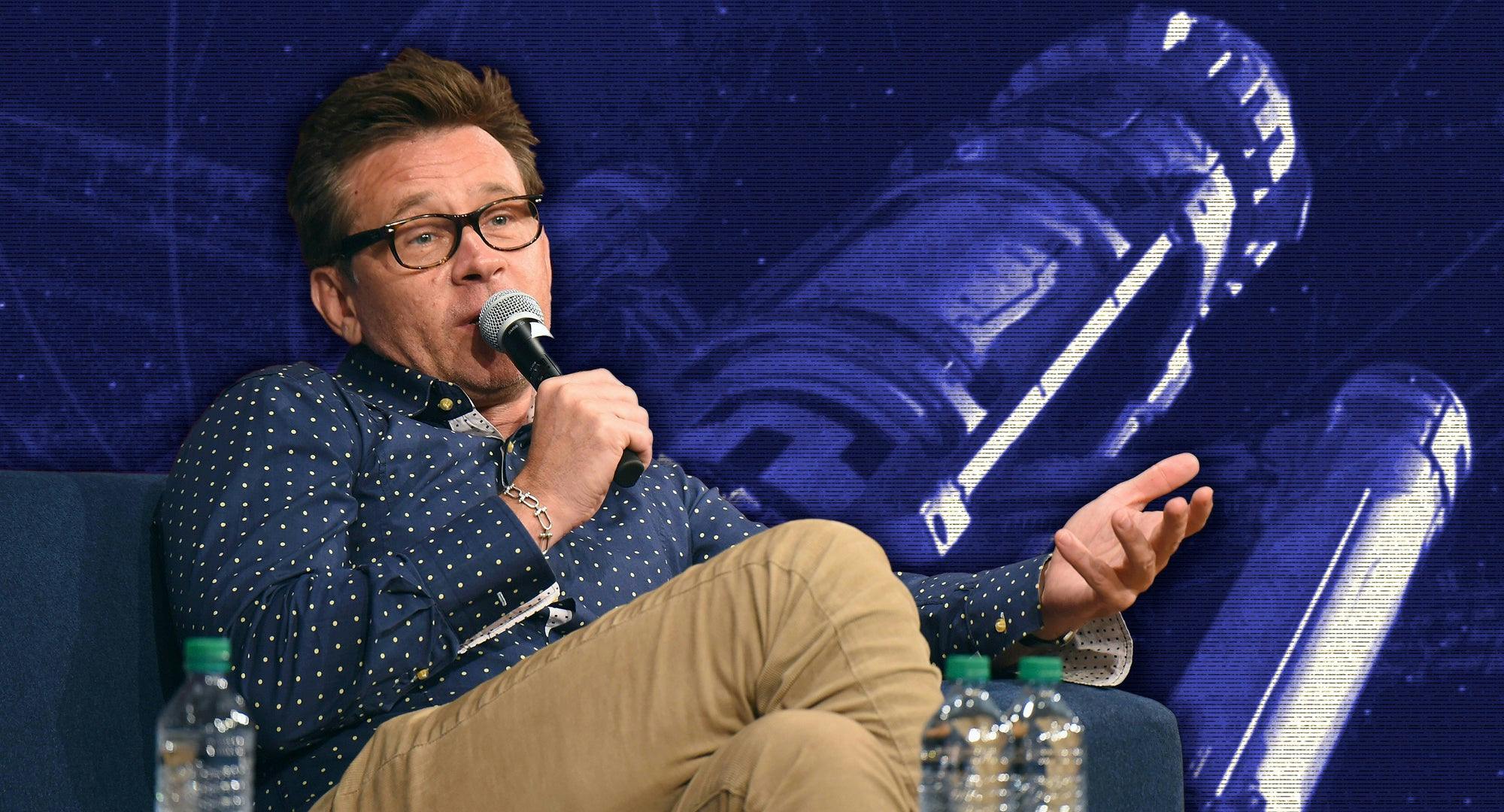
StarTrek.com / Getty
This article was originally published November 12, 2019.
Fans of Enterprise will remember Connor Trinneer as the engineer with a winning smile, Trip Tucker. Though Trip was clearly meant to be the show’s eye candy, Trineer imbued the character with depth, and the show’s writing staff provided great storylines, like his accidental alien pregnancy in season one. As a scientist myself I have always been impressed by how well he brought Trip to life, both as an engineer and as a person trying to connect with other humanoids.
This fall, Trinneer has a role in the second season of the USA series The Purge , which is adapted from the film franchise of the same name. While Star Trek shows viewers an optimistic vision of a utopian future, The Purge does something very different, portraying a society that purportedly controls violence by unleashing it for one night a year. Arguably, it’s about human disconnection, rather than Trek ’s theories of intergalactic community.
I caught up with the Enterprise actor by phone to talk about this new, radically different role, his experience in the Star Trek fan universe, and what would happen if Trip, like Connor himself, had a great grandmother who was Native American.
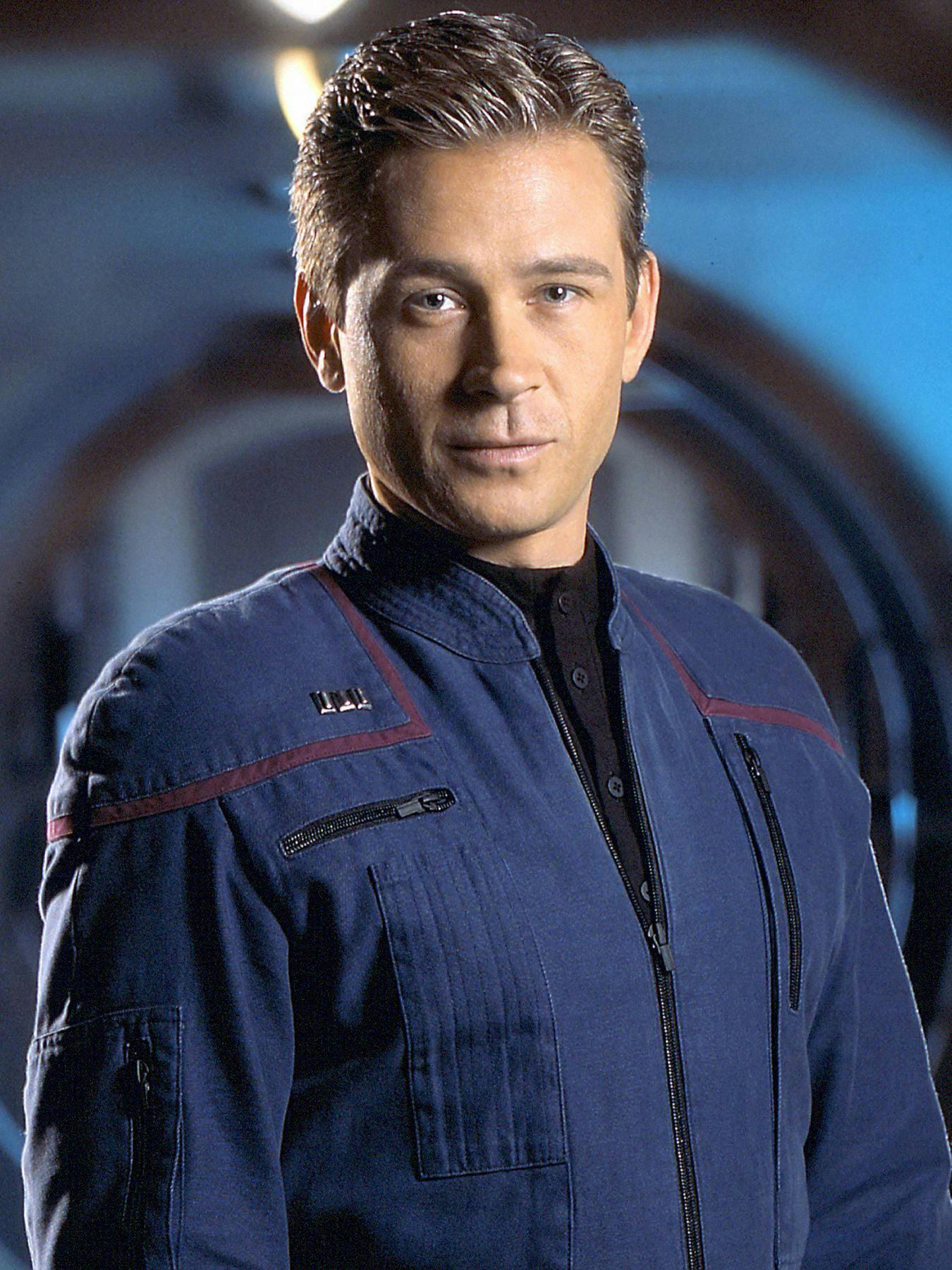
StarTrek.com
StarTrek.com: The premise of The Purge is that for 12 hours every year, almost all crimes, including murder, are legal. The violence is intense. How do you prepare to work on heavy material like that?
Connor Trinneer: Well, you really have to break it down and put it in its base element of telling the truth and you know, to a certain extent suspending your level of disbelief. At the end of the day, I've got to find the common denominator that is workable for me through just trying to find the truth of a moment; that's really all I have control of. You can literally imagine anything. The worst possible scenario, the best possible scenario. And the luxury that we get as actors is that we get to play in that little gap and try to make a story of it. So, I don't find it difficult really to ever come down from any of those things.
Now that you’ve filmed a season of the show, how are you feeling about it?
CT: I was really pleased with how The Purge turned out. Your job is to use your imagination and figure out how you would live, survive, thrive in that universe. Having seen the first episode, having shot them, I was really impressed with the sort of the human element that is put into this season.
Do you see the Star Trek and The Purge franchises as offering competing visions or complementary visions?
CT: I think the best storytelling involves humanity. One is challenged by it, one is struggling with it, and one either succeeds or fails in it. Enterprise is all about going boldly and showing our humanity and our humanness, and really using that as a focus for whatever its challenges may be. The Purge puts you in a position where you really have to answer those questions. The Purge deals with overcoming the negative aspects of its effect on people, and also what a human being can do to survive and thrive and make honorable decisions. That’s was this season was to me.
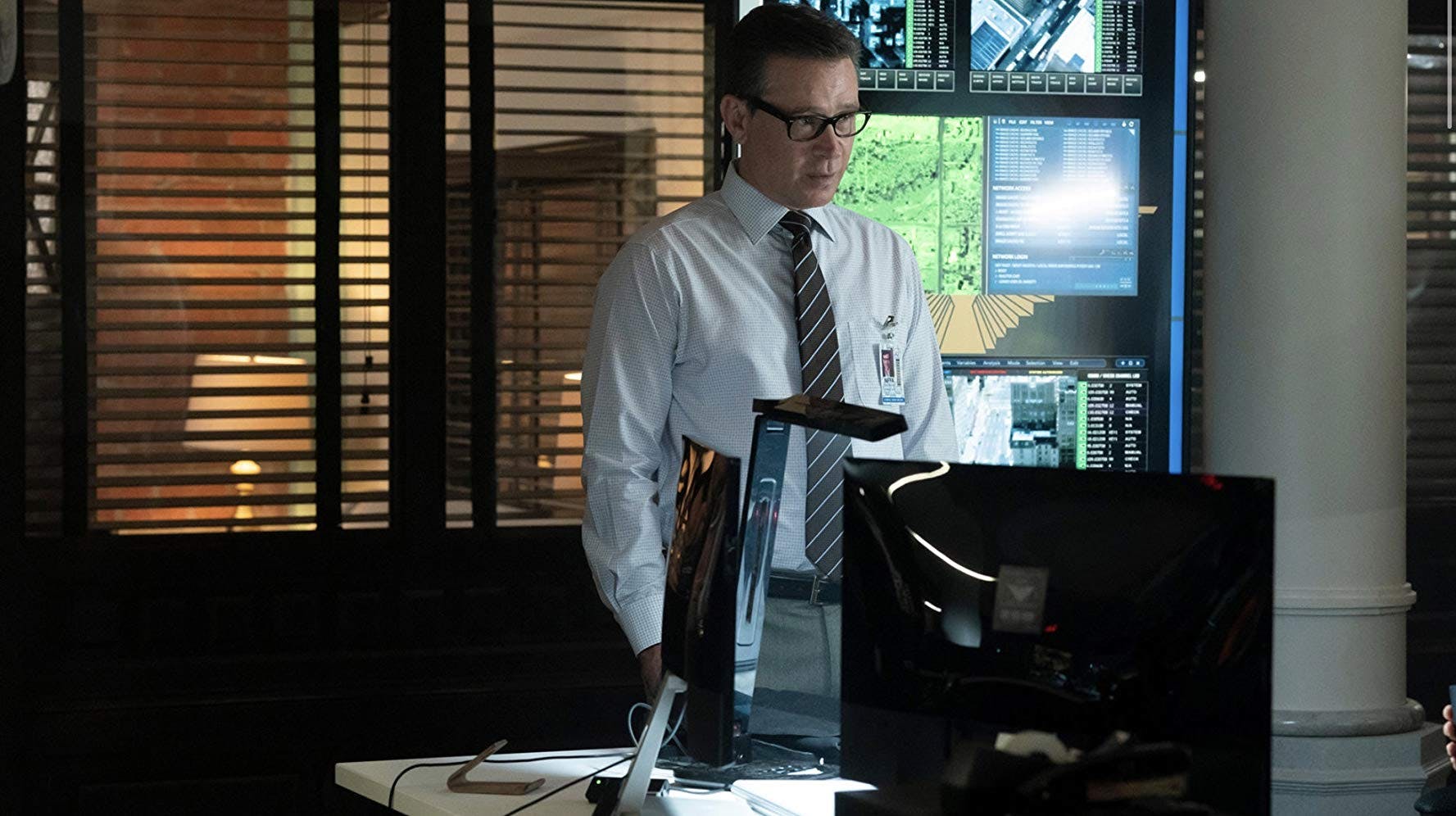
In your role you’re playing a middle manager for the government, overseeing an office that monitors the purge. It seems like his take is, "I'm just following orders and this is my white-collar job that is also a normalized as a normal civil service job in our society." For him, is this just his job?
CT: He also believes in it. That’s a good word, “normalized,” and we live in a time when that word specifically has a lot of depth to it that it didn't before. I think that this show exists because of the time that we live in. I think that the best of storytelling and the best of TV holds a mirror up [to the real world].
For instance, Enterprise was completely influenced and changed by [September 11th, 2001.] People should not watch that show without the knowledge that 9/11 happened; [it] changed the narrative of what we were going to be talking about. In The Purge , you have a guy who believes this is a good thing. He believes that this is necessary and that they're doing the right thing. He's a good person. He's got a family. You see people normalizing their realities into something that we think of as the worst of the worst.
I'm surprised The Purge hasn't come out more as a kind of reference point for the question of whether this is the direction that American culture is going in.
CT: Well, I think that season two will be a good litmus test for that. Because, again, it doesn't address it as a one-night event. It addresses it as a [part of] life. The Purge is one thing, shocking and scary. But to see how it's normalized in everyday life — I'm very curious to see how will land with viewers.
You spend some amount of time every year traveling to conventions like the Star Trek Las Vegas Convention, and the Star Trek Cruise and you also go to a few in Europe. If there was a Purge Con, would you go?
CT: Hell yeah!
These events seem like a lot of work. People tell you all kinds of personal stuff. How do you deal with that?
CT: I enjoy them. I just got back from Brazil. I'm going to Birmingham, England in a few days. I've traveled the world. I've met some extraordinary people. I don't feel like an animal in the zoo. I'm there because there is this group of people who are gathering for a week of connection with one another. Sometimes it’s the one vacation they take each year. I'm part of the entertainment, and I feel positive about that. I take a lot of pride in that. I'm very thankful that I get asked, and that I, hopefully, am a part of a good experience with people. There is, absolutely, nothing negative about the idea of like-minded people coming in to share their thoughts, and they warmly embrace each other whenever they can especially in the theme that is Star Trek .
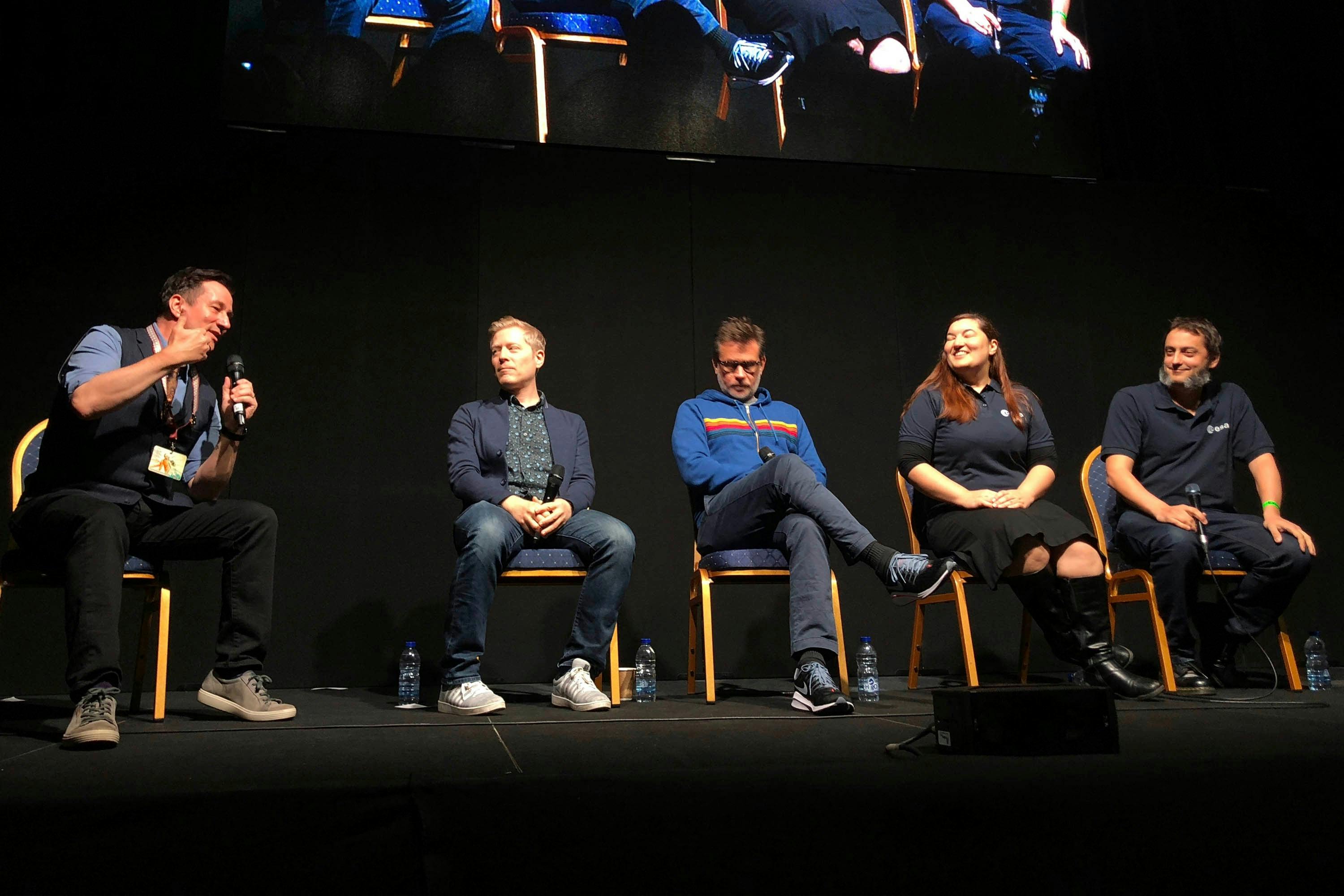
At my first Star Trek Convention, I thought, "Wow you can go to a thing where people just gather because they believe in Infinite Diversity in Infinite Combinations?”
CT: Right. And in my normal life, people don't walk up to me in a sidewalk and say, "You know what? You've inspired me to be an engineer. You helped me get through this, that, or the other thing in my life that was difficult." I hear that all the time [at conventions]. And I take a lot of pride in that, and the fact that nobody has ever walked up to me and said, "You ruined my life!"
Going to these conventions means that you spend a lot of time with the actors who were not on the same show as you. Have you developed friendships because of the conventions?
CT: A hundred percent. And it's also similar, I would think for the fans. And it is, I think, for us as well that this is an opportunity —four, five, six times a year — to reconnect with these people. It's like seeing an old friend that you've always liked that you just sort of fall into that rhythm again. And that's also one of the great joys of doing this.
We had a really big loss in September with Aron Eisenberg very suddenly passing away.
CT: Aron was such a good soul. Whenever I saw him, we just laughed. And he was so intelligent and so quick. I heard a story that I think it really sort of gets to the heart of who he was. I heard that at the Las Vegas convention, on the last day when everybody was leaving, he would get up in the morning and go down to the lobby by the elevators and wait for all the actors to come down to leave and would spend all morning there to say goodbye. He lit up the room.
Don't forget to say "hi" to someone, don't forget to give them a hug if you feel like it, don't forget to tell somebody that you care for them.
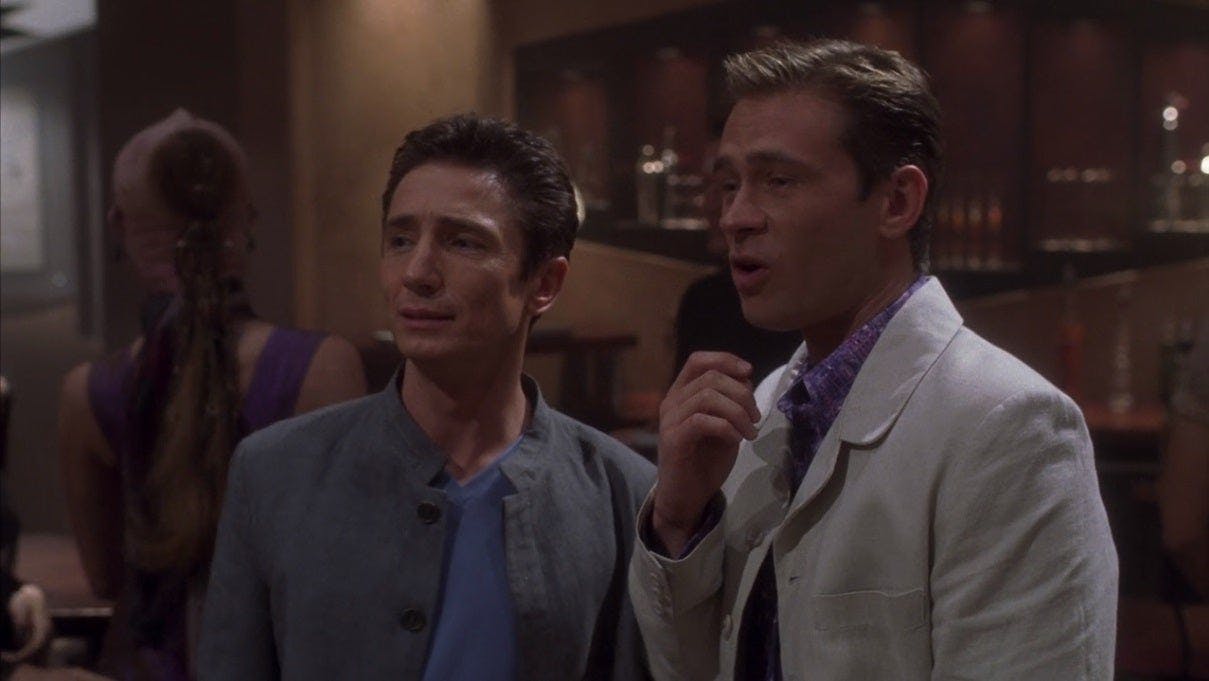
On a more personal note, I know your father’s grandmother was Choctaw. But you grew up pretty far from the Choctaw Nation home in Oklahoma, right?
CT: I'm very proud of my great grandmother’s Choctaw heritage. I've never lived in an environment where there are a lot of Native American people, and this industry that I'm in has got so little to do with bringing attention to that experience. There there are so many people like me in America who have Native heritage, but for one historical reason or another have been cut off from it. I’d like to see that story explored in TV and film – with care.
If there was an opportunity to come back to the Trip Tucker storyline, is being descended from a Native American something that you would be interested in seeing written into his story? CT: One hundred percent. I think it's an underrepresented narrative that, again, a lot of us share because we have this heritage. Some are enrolled [in their nations or tribes] and some aren’t. I think it would be fascinating to address that through a character who got schooled about his family’s past decisions and had to come to a new understanding about his ancestors.
This interview has been edited and condensed.
Dr. Chanda Prescod-Weinstein is an Assistant Professor of Physics and Astronomy and Core Faculty in Women’s Studies at the University of New Hampshire. Her research focuses on cosmology and particle physics. Find her on twitter @IBJIYONGI.
Get Updates By Email

IMAGES
VIDEO
COMMENTS
Tucker was born in 2121. His nickname "Trip" is short for "Triple", as he is the third generation of his family to be named Charles Tucker. He joined the United Earth Starfleet in 2139 and first met Jonathan Archer around 2143, a decade prior to the launch of Enterprise, when the two worked together on an early warp 2 prototype vessel using the ...
Should Star Trek Enterprise get a conclusion?Did you know? …that contrary to the belief of visual Star Trek fans around the world, the episode "These are t...
Star Trek: Enterprise executive producer and co-creator Brannon Braga admits that Commander Trip Tucker (Connor Trinneer) didn't have to die in the series finale. After 4 seasons, Enterprise ended in 2005 with a final episode titled, "These Are The Voyages..."Enterprise's finale angered fans and members of the cast, including series lead Scott Bakula, because it was really about Star Trek: The ...
If your favorite character was Trip, then you might enjoy some books that continue Trip's adventures after his so-called death. These books work on the theory that he didn't actually die, but was tasked with a Section 31 mission into Romulan space and his death had to be faked. You can find some of these novels here under the novels section ...
The tragic death of Commander Trip Tucker was one of Star Trek: Enterprise's saddest moments, but did he actually really die in the much-discussed series fin...
Trip Tucker's death was a bone of contention. The series finale of Star Trek: Enterprise after four seasons still stands out sixteen years later and not for good reasons. Most everyone disliked the inclusion of characters Will Riker and Deanna Troi from Star Trek: The Next Generation as well as the jump forward in time and the holodeck simulation.
Published Oct 31, 2022. Trip Tucker's death is a problem Star Trek's current shows can fix by ignoring Enterprise's wildly disliked finale and bringing Trip back. Killing off Trip Tucker (Connor Trinneer) in Star Trek: Enterprise 's finale remains a sore spot, but Trip's death can be fixed, and the Chief Engineer can even return in the current ...
Trip Tucker's death in Star Trek: Enterprise's controversial finale still irks fans almost 20 years later. Connor Trinneer, who played Trip, believes fans should "get over it" and move on from the ...
Commander Charles "Trip" Tucker III (Connor Trinneer) is one of Star Trek: Enterprise's most popular characters and Trip's death is still controversial 18 years after Enterprise signed off in 2005. Trinneer played Trip for all 4 seasons of Star Trek: Enterprise.The prequel recreated the classic Captain/Vulcan/Southern gentleman dynamic of Star Trek: The Original Series and Trip filled the role ...
Rather than merely recite the official denouements of Capt. Jonathan Archer, T'Pol, Trip Tucker, Malcolm Reed, Hoshi Sato, Dr. Phlox, and the memorable, memorable character of Ensign Mayweather ...
As Billingsley, who played Doctor Phlox on Enterprise, MC'ed the event, the topic of Trip's death came up. Surprisingly just about everyone, it was Trinneer who told the crowd to "get over it".
Connor Trinneer scored the role of Commander Charles "Trip" Tucker on Star Trek: Enterprise in 2001. It was a much-ballyhooed prequel to the original Star Trek, set about 100 years before Shatner and Nimoy were living long and prospering. Trinneer's Tucker was Captain Jonathan Archer's (Scott Bakula) chief engineer and had a prominent ...
In a 2020 interview with TrekMovie, Connor Trinneer was asked if he agrees with fan criticisms of the "Star Trek: Enterprise" finale and the actor insisted he was happy with Trip's death ...
Harbinger: Directed by David Livingston. With Scott Bakula, John Billingsley, Jolene Blalock, Dominic Keating. With Reed and Hayes fighting over a training program and Trip seemingly making T'Pol jealous, Enterprise discovers a dying alien in a pod with technology similar to the Spheres.
Though some "Star Trek" fans point to the death of Charles "Trip" Tucker in the final "Enterprise" episode, "These Are The Voyages," there's another death of sorts for the character that looms ...
Connor Trinneer feels "very lucky" to have played Commander Charles "Trip" Tucker III for 4 seasons of Star Trek: Enterprise, and he essayed the character through many changes. Trip was the Chief Engineer of the NX-01 Enterprise commanded by his best friend, Captain Jonathan Archer (Scott Bakula). Trip was also one-third of Enterprise's command ...
Watch on YouTube. In fact, it is the year 2370, and Commander Riker—troubled by the events of the TNG episode "The Pegasus"—is revisiting the events of the year 2161 at the urging of TNG ...
TM: As Trip Tucker, you faced death, loss, romance, being a clone, pregnancy … what was the biggest WTF moment when somebody handed you a script? CT: A couple of 'em. Out of the gate, episode ...
Charles "Trip" Tucker III may have been killed in the series finale, but actor Connor Trinneer bristles at the suggestion that the cancelled Star Trek: Enterprise killed the Trek franchise ...
Malcolm McDowell isn't crazy about Kirk's death scene. ... And few characters from the series get more love than Trip Tucker, played by Connor Trinneer. Tucker was front and center for some of the ...
This article was originally published November 12, 2019. Fans of Enterprise will remember Connor Trinneer as the engineer with a winning smile, Trip Tucker. Though Trip was clearly meant to be the show's eye candy, Trineer imbued the character with depth, and the show's writing staff provided great storylines, like his accidental alien pregnancy in season one.
http://StarTrek.com talks with Connor Trinneer about his First Contact with Star Trek and the pressure of playing a pregnant Trip Tucker.Subscribe to the Sta...